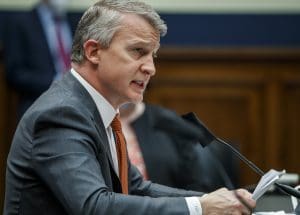Whistleblower says he was punished for fighting plan to 'flood' cities with unproven drug
Dr. Richard Bright told a congressional hearing that Trump administration officials wanted to push an unproven and potentially dangerous drug.

Dr. Richard Bright, a whistleblower who claims he was removed from a top position within the Department of Health and Human Services after he opposed the widespread use of the unproven drug hydroxychloroquine against the novel coronavirus, is testifying Thursday before the House Committee on Energy and Commerce’s health subcommittee.
From Dr. Bright’s May 14 testimony before the subcommittee:
REP. ELIOT ENGEL (D-NY): The administration has failed at every turn. The president has sidelined our best scientists, pushed baseless conspiracy theories, and more recently prescribed unproven remedies like Lysol to suffering Americans. Since the early days of the outbreak, the president encouraged doctors to prescribe [hydroxy]chloroquine to suffering Americans despite a lack of evidence supporting its use.
On April 24, the president’s hand-picked FDA commissioner even came out against the use of chloroquine for COVID-19 cases.
Doctor, what are the dangers of chloroquine if prescribed incorrectly, and what happened when you raised the issue of chloroquine use in coronavirus patients with HHS leadership?
DR. RICHARD BRIGHT, FORMER DIRECTOR OF THE BIOMEDICAL ADVANCED RESEARCH AND DEVELOPMENT AUTHORITY: Congressman, our concern centered around the potential use of chloroquine in people who were infected with this coronavirus. There are data of the effective use and safe use of chloroquine in malaria patients and other patients and other indications.
We also knew that there were potential safety risks with chloroquine that caused irregular heart rhythms and even in some cases death.
So our concern was with limited information and knowledge, especially of its use in COVID-19-infected patients, and the potential for those risks, then we should make sure that any studies with that drug were done in a carefully controlled clinical study under close, watchful eye of a physician so they could respond to a patient if they did experience one of those adverse events.
There wasn’t sufficient data at that time to support use of this drug in patients with COVID-19 without close physician supervision.
ENGEL: And when you raised that issue of chloroquine use in coronavirus patients with HHS leadership, what happened to you? You were removed as the director of BARDA, is that not true?
BRIGHT: I believe part of the removal process for me was initiated because of a pushback that I gave when they asked me to put in place an expanded access protocol that would make chloroquine more freely available to Americans that were not under the close supervision of a physician and may not even be confirmed to be infected with the coronavirus.
The scientists at FDA, BARDA, NIH, and CDC worked hard to switch that to an emergency-use authorization with strict guardrails that the patients would be in a hospital, confirmed to be infected with this virus, under close supervision of a doctor, and who could not otherwise participate in a randomized controlled study.
My concerns were alleviated somewhat by being able to lock that in the stockpile with those conditions.
However, my concerns were escalated when I learned that leadership in the Department of Health and Human Services were pushing to make that drug available outside of this emergency-use authorization to flood New York and New Jersey with this drug regardless of the EUA.
And when I spoke outside of our government to share my concerns for the American public, that, I believe, was the straw that broke the camel’s back.
Published with permission of The American Independent Foundation.
Recommended

Biden campaign launches new ad focused on Affordable Care Act
Former President Trump has said he wants to do away with the popular health care law.
By Kim Lyons, Pennsylvania Capital-Star - May 08, 2024
Ohio doctors fear effects of emergency abortion care case set to go before U.S. Supreme Court
A federal law that allows emergency departments to treat patients without regard to their ability to pay will be under U.S. Supreme Court scrutiny this week, and Ohio doctors are concerned about the case’s local impact on emergency abortion care.
By Susan Tebben, Ohio Capital Journal - April 23, 2024
House GOP votes to end flu, whooping cough vaccine rules for foster and adoptive families
A bill to eliminate flu and whooping cough vaccine requirements for adoptive and foster families caring for babies and medically fragile kids is heading to the governor’s desk.
By Anita Wadhwani, Tennessee Lookout - March 26, 2024












































































